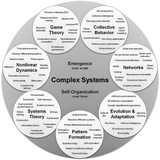tgoop.com/ComplexSys/5666
Last Update:
Wastewater-based Epidemiology for COVID-19 Surveillance: A Survey
https://arxiv.org/abs/2403.15291
The pandemic of COVID-19 has imposed tremendous pressure on public health systems and social economic ecosystems over the past years. To alleviate its social impact, it is important to proactively track the prevalence of COVID-19 within communities. The traditional way to estimate the disease prevalence is to estimate from reported clinical test data or surveys. However, the coverage of clinical tests is often limited and the tests can be labor-intensive, requires reliable and timely results, and consistent diagnostic and reporting criteria. Recent studies revealed that patients who are diagnosed with COVID-19 often undergo fecal shedding of SARS-CoV-2 virus into wastewater, which makes wastewater-based epidemiology (WBE) for COVID-19 surveillance a promising approach to complement traditional clinical testing. In this paper, we survey the existing literature regarding WBE for COVID-19 surveillance and summarize the current advances in the area. Specifically, we have covered the key aspects of wastewater sampling, sample testing, and presented a comprehensive and organized summary of wastewater data analytical methods. Finally, we provide the open challenges on current wastewater-based COVID-19 surveillance studies, aiming to encourage new ideas to advance the development of effective wastewater-based surveillance systems for general infectious diseases.
BY Complex Systems Studies

Share with your friend now:
tgoop.com/ComplexSys/5666
